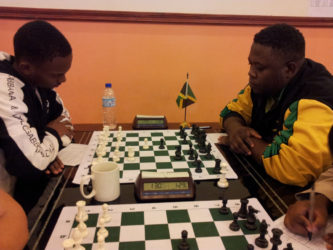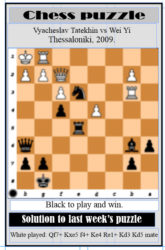 The mind game of chess was among 26 sport disciplines which had applied for recognition as an Olympic Sport at the 2020 Games in Tokyo. The request was denied. Chess was not included on the shortlist of new sports being considered for the 2020 Olympics, being eliminated along with 17 other pastimes. Many previous attempts were made by the World Chess Federation (FIDE) to have chess included as an Olympic sport, but these were also unsuccessful.
The mind game of chess was among 26 sport disciplines which had applied for recognition as an Olympic Sport at the 2020 Games in Tokyo. The request was denied. Chess was not included on the shortlist of new sports being considered for the 2020 Olympics, being eliminated along with 17 other pastimes. Many previous attempts were made by the World Chess Federation (FIDE) to have chess included as an Olympic sport, but these were also unsuccessful.
There are some popular arguments against having chess in the Olympics, either Summer or Winter, since the game could conceivably be a part of either festival. Chiefly, there is the common argument that chess is not a sport, at least not in the sense of Olympic athletic competition, though it isn’t clear this is the case.

Naturally, the International Olympic Committee (IOC) has a number of criteria it looks at when determining if a sport should be considered for inclusion. Perhaps the two most important factors are popularity and universality. In the column’s estimation, chess scores well in both areas. There is no denying the fact chess is popular. Millions play it regularly, in person and on the internet. Its universality is that hundreds of millions know how to play the game. Few sports can claim that level of participation. The game is played all over the world. Its only competitor is football or (soccer). There has been an extraordinary explosion of chess in India and China—the two most populated countries in the world—over the past few decades. There is virtually no corner of the earth where you cannot encounter strong players. As such, any Olympic event would be extensively and universally attended. At the 2014 Chess Olympiad in Norway, 170 nations contended for honours. Therefore, popularity and universality should not stand in the way of the failure of chess to qualify for inclusion in the Olympics.
There is also the question of transparency and fairness. Chess is a fair game particularly at strong events, and, especially when titles are at stake. There are protections against cheating with computers and electronic devices. So chess should score highly in that respect. But owing to the subjective nature of transparency, this column chooses to offer no comment in this direction. Good governance by the umbrella body, in this case FIDE, is most likely a consideration under the microscope also.
Would competing in the Olympics add anything substantial to the chess world? This column thinks so. The Olympics is a prestige festival. It is spectacular and fulfilling. Sometimes it cannot be counted in dollars. Sometimes it can. But what it can do, is to make you famous forever, especially those in underprivileged countries where striking gold is practically non-existent. Only FIFA can actually match the Olympics for prestige with its sensational World Cup. And chess is not far behind in terms of participation by countries with its own distinctive Olympiad.
The debate over whether chess is a sport or not, continues unabated. Although the debate is simplistic, it is important if chess is desirous of entering the arena of Olympic participation. Albeit the IOC has graciously recognized chess as a sport. Assuredly, there are other factors which hinder chess from being an Olympic sport. We have to wait and see. In time all the pieces would fall into place. As of now, as Chinua Achebe noted “The centre cannot hold. And things fall apart. ”
Chess games
The following games were played at the 2016 Bilbao Masters Tournament in Spain. World chess champion Magnus Carlsen won the tournament.
White: Magnus Carlsen
Black: Anish Giri
 1.d4 d5 2.Bf4 Bf5 3.e3 e6 4.Bd3 Bxd3 5.Qxd3 c6 6.Nd2 Nf6 7.Ngf3 Be7 8.O-O O-O 9.h3 Nbd7 10.a4 c5 11.a5 c4 12.Qe2 b5 13.axb6 axb6 14.Ne5 Nxe5 15.dxe5 Nd7 16.Qg4 Re8 17.h4 f5 18.Qh3 Rxa1 19.Rxa1 c3 20.bxc3 Qc7 21.c4 Nxe5 22.Qg3 Bd6 23.cxd5 exd5 24.Nb3 Qxc2 25.Nd4 Qc8 26.h5 Qd7 27.Rb1 Bc7 28.f3 Qf7 29.Ra1 Bd6 30.Ra6 Qxh5 31.Rxb6 Nc4 32.Rxd6 Nxd6 33.Bxd6 Rxe3 34.Be5 Qg6 35.Qf4 Re1+ 36.Kf2 Ra1 37.Qd2 Ra8 38.Nxf5 Qe6 39.Qg5 g6 40.Nh6+ Kf8 41.Ng4 Ke8 42.Nf6+ Kf7 43.Nxh7 Ra4 44.Qd8 Ra2+ 45.Kg1 1-0.
1.d4 d5 2.Bf4 Bf5 3.e3 e6 4.Bd3 Bxd3 5.Qxd3 c6 6.Nd2 Nf6 7.Ngf3 Be7 8.O-O O-O 9.h3 Nbd7 10.a4 c5 11.a5 c4 12.Qe2 b5 13.axb6 axb6 14.Ne5 Nxe5 15.dxe5 Nd7 16.Qg4 Re8 17.h4 f5 18.Qh3 Rxa1 19.Rxa1 c3 20.bxc3 Qc7 21.c4 Nxe5 22.Qg3 Bd6 23.cxd5 exd5 24.Nb3 Qxc2 25.Nd4 Qc8 26.h5 Qd7 27.Rb1 Bc7 28.f3 Qf7 29.Ra1 Bd6 30.Ra6 Qxh5 31.Rxb6 Nc4 32.Rxd6 Nxd6 33.Bxd6 Rxe3 34.Be5 Qg6 35.Qf4 Re1+ 36.Kf2 Ra1 37.Qd2 Ra8 38.Nxf5 Qe6 39.Qg5 g6 40.Nh6+ Kf8 41.Ng4 Ke8 42.Nf6+ Kf7 43.Nxh7 Ra4 44.Qd8 Ra2+ 45.Kg1 1-0.
White: Sergey Karjakin
Black: Magnus Carlsen
1. d4 Nf6 2. c4 e6 3. Nf3 d5 4. Nc3 Bb4 5. Qa4+ Nc6 6. e3 O-O 7. Qc2 Re8 8. Bd2 a6 9. a3 Bd6 10. h3 Bd7 11. cxd5 exd5 12. Bd3 Na7 13. Qb3 c6 14. Qxb7 Nb5 15. Nxb5 axb5 16. Ne5 Rb8 17. Qa6 Ra8 18. Qb7 Rb8 19. Qa6 Ra8 1/2-1/2.
White: Magnus Carlsen
Black: Wei Yi
1. Nf3 d5 2. g3 g6 3. Bg2 Bg7 4. O-O Nf6 5. c4 O-O 6. cxd5 Nxd5 7. d4 Nb6 8. Nc3 Nc6 9. d5 Na5 10. e4 c6 11. Bf4 Nac4 12. Qe2 cxd5 13. exd5 Bg4 14. h3 Bxf3 15. Bxf3 Nd6 16. Rfe1 Re8 17. Rac1 a6 18. b3 Rc8 19. Qd2 Nd7 20. Na4 Rxc1 21. Qxc1 Bd4 22. Qd2 Bg7 23. h4 h5 24. Nb2 Nb5 25. Re3 Nd4 26. Bg2 e5 27. dxe6 Nxe6 28. Nc4 Nxf4 29. Rxe8+ Qxe8 30. Qxf4 b5 31. NQe5 32. Qxe5 Bxe5 33. b4 Bd6 34. Bb7 Nb8 35. Nd5 Kf8 36. Kg2 Ke8 37. f3 f5 38. Kf2 Kd7 39. Nf4 Kc7 40. Bd5 Bxf4 41. gxf4 Kd6 42. Bf7 Nc6 43. a3 Ne7 44. Ke1 Kd7 45. Kd1 Kd6 46. Kd2 Kd7 47. Kd3 Kd6 48. Kc2 Kd7 49. Kb3 Kd6 50. a4 Nc6 51. axb5 axb5 52. Kc3 Ne7 53. Kd2 Nd5 54. Bxg6 Nxb4 55. Bxh5 Nd5 56. Be8 Nxf4 57. Bxb5 Ke5 58. Bf1 Ng6 59. h5 Nh4 60. Ke2 Nxf3 1/2-1/2.
White: Anish Giri
Black: Hikaru Nakamura
1. d4 Nf6 2. c4 e6 3. Nf3 d5 4. Nc3 Be7 5. Bf4 O-O 6. e3 c5 7. dxc5 Bxc5 8. cxd5 exd5 9. Be2 Nc6 10. O-O a6 11. Rc1 Ba7 12. Ne5 Ne7 13. Bg5 d4 14. exd4 Qxd4 15. Qxd4 Bxd4 16. Nf3 Bxc3 17. Rxc3 Ned5 18. Rc4 h6 19. Bd2 b5 20. Rd4 Re8 21. Re1 Ne7 22. Bd3 Be6 23. a4 Nf5 24. Rf4 Nd6 25. axb5 axb5 26. Rd4 Nc4 27. Bc3 Rac8 28. Rb1 Bd5 29. Nd2 Nxd2 30. Bxd2 Be4 31. Bc3 Bxd3 32. Rxd3 Ne4 33. h3 Nxc3 34. bxc3 Rc5 35. Rd2 Rxc3 36. Rxb5 Rc7 37. Rb1 Rec8 38. Rbd1 Rc1 39. Rxc1 Rxc1+ 40. Kh2 g6 41. g4 g5 42. Kg2 Rc3 43. Rd6 Kg7 44. Rb6 Rd3 45. Rc6 Rb3 46. Ra6 Rd3 47. Rc6 Rb3 48. Ra6 1/2-1/2.





